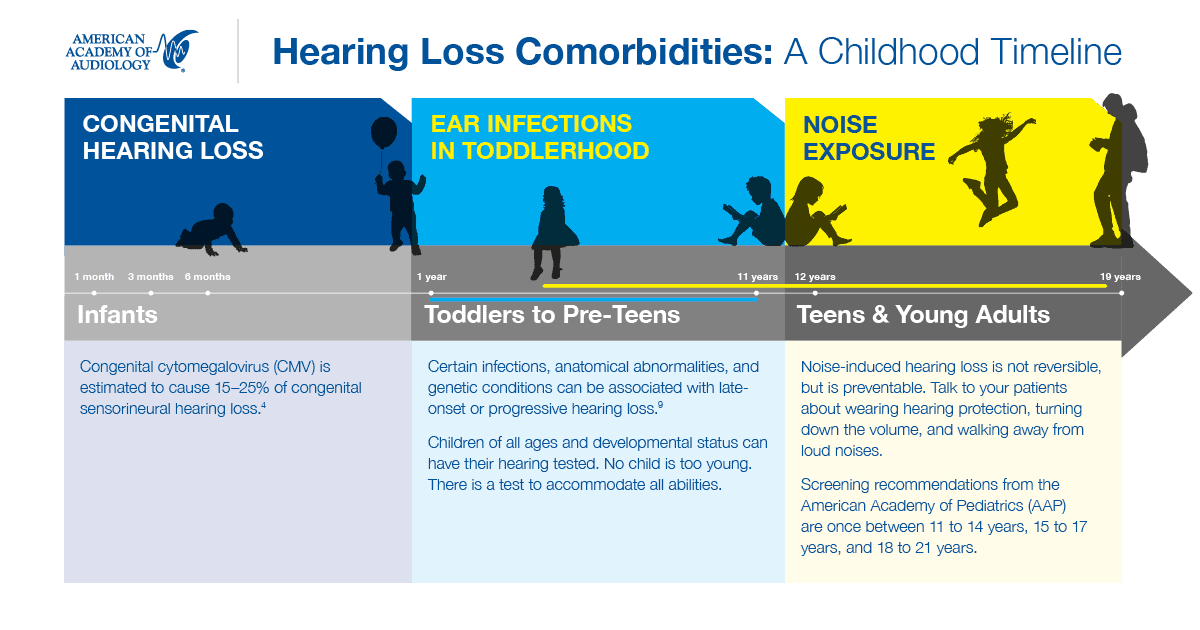Hui Shing Andy Lau, AuD, gave a brief overview of pediatric hearing loss and the importance of seeing an audiologist. If you or your child are experiencing hearing loss, find an audiologist in your area and schedule a screening today.
Hearing Loss in Children
Although hearing loss can happen at any age, a growing number of kids and teens are damaging their hearing by prolonged noise exposure to loud noise. This type of damage is called noise-induced hearing loss, which is permanent and is almost always preventable! Approximately 12 percent of all children ages 6–19 have noise-induced hearing loss.
Noise-induced hearing loss is caused by damage to the hair cells that are found in the inner ear. Hair cells are small sensory cells that convert the sounds we hear (sound energy) into electrical signals that travel to the brain. Once damaged, our hair cells cannot grow back, causing permanent hearing loss. Noise-induced hearing loss can be immediate or it can take a long time to be noticeable.
Prevention includes understanding the hazards of noise and practicing good hearing health. The loudness of sound is measured in units called decibels (dB). Noise-induced hearing loss can be caused by prolonged exposure to any loud noise over 85dB.
Childhood Noise Risks
- Noisy toys
- Band class
- Farm equipment
- Shop class
- Concerts
- Firecrackers and fireworks
- MP3 Players
- Sporting events
- Motorbikes
- Movie theaters
- Arcades
- Firearms
- Power tools
Protect Your Child’s Hearing
- Wear proper hearing protection (earmuffs or earplugs) when in noisy environments (concerts, sporting events, fireworks displays, car races). Hearing protection comes in a variety of sizes and textures to provide an optimum fit. Custom-made earplugs can be obtained from an audiologist.
- Turn down the volume.
- Walk away from loud noise.
- Receive hearing tests.
- Learn about audiology screenings at schools.
- Learn about the connection between hearing and first-grade reading.

Can Children Use Over-the-Counter Hearing Aids?
Over-the-counter (OTC) hearing aids look similar to hearing aids that are available at an audiologist’s office however they differ in a few very important ways, including who is a good candidate.
Both the Food and Drug Administration (FDA) regulations as well as position statements from the American Academy of Audiology maintain the strong position that OTC hearing aids are not approved for use in children younger than age 18.
Using an OTC hearing aid on a child introduces significant safety concerns for the child. OTC hearing aids may also cause delays in language learning, school readiness, and social-emotional development. Seeking care from a pediatric audiologist helps ensure that your child is properly diagnosed, treated, and supported throughout their hearing loss journey.
Treatment and Management
If you have a newborn, don’t forget to get a newborn hearing screening.
If you think your child may have a hearing loss and/or you would like more information regarding hearing protection, an audiologist can help navigate these needs. Therefore, “Find an Audiologist” and set up an appointment to get your child’s hearing checked.
